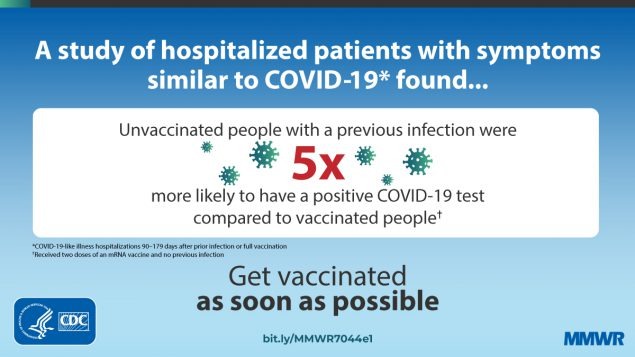CDC Lab Tests Confirm Vaccines Are Better Than "Natural Immunity"
The US Centers for Disease Control and Prevention (CDC) has published a new study comparing the protection offered by the COVID-19 vaccines with that of natural immunity through a previous SARS-CoV-2 infection. As with previous research on the topic, the new study found the immune response triggered by vaccines is more robust than the response from an infection, further dashing the myth that having had COVID-19 offers substantial protection against reinfection.
Latest research
The CDC published its new lab-confirmed COVID-19 immunity study in its latest Morbidity and Mortality Weekly Report (MMWR), making it clear to the public and science skeptics that vaccination offers the best protection against contracting SARS-CoV-2, the virus that causes COVID-19. The study's key finding is simple: unvaccinated adults who previously had COVID-19 are five times more likely than vaccinated individuals to catch the virus.
The superior protection against COVID-19 was observed in people who received one of the mRNA vaccines and is said to persist for at least six months following vaccination. Though vaccinated individuals can still contract the virus, numerous studies have demonstrated that unvaccinated individuals remain at far greater risk of hospitalization and death due to the disease.

In a statement about the new study, CDC Director Dr. Rochelle P. Walensky said:
We now have additional evidence that reaffirms the importance of COVID-19 vaccines, even if you have had prior infection. This study adds more to the body of knowledge demonstrating the protection of vaccines against severe disease from COVID-19. The best way to stop COVID-19, including the emergence of variants, is with widespread COVID-19 vaccination and with disease prevention actions such as mask wearing, washing hands often, physical distancing, and staying home when sick.
Despite the free availability of three different COVID-19 vaccine options in the US, a percentage of the population continues to refuse inoculation, with some citing beliefs that natural immunity caused by a previous infection is equal to or better than immunity resulting from the vaccine.
Multiple reputable agencies and institutions, including the CDC and Johns Hopkins University, have attempted to educate the public on facts versus fiction regarding the pandemic and vaccines. A combination of poor understanding, politics, and misinformation largely disseminated on social media, however, has resulted in a public health nightmare for the US, which is expected to reach 750k COVID-19 deaths by the end of the year.
The data
The CDC's latest study pulled data from the VISION Network on adults ages 18 and older who were hospitalized with symptoms of COVID-19. Lab tests were used for these symptomatic individuals to determine whether their condition was due to COVID-19 or a different illness. Using this information, the researchers were able to compare the infection risk in previously infected unvaccinated patients and people who had previously been vaccinated with an mRNA vaccine, but who hadn't previously contracted the virus.
The study focused on patients who were vaccinated or had prior COVID-19 infections 90 to 179 days before being hospitalized with COVID-19 symptoms. The CDC was able to confirm using laboratory testing that mRNA vaccines offer better protection compared to previous infection with the SARS-CoV-2 virus. The agency notes that the researchers behind the study used electronic health records and vaccine registries to verify that patients were vaccinated as claimed.
The findings led the researchers to state in their study, "All eligible persons should be vaccinated against COVID-19 as soon as possible, including unvaccinated persons previously infected with SARS-CoV-2."
Previous studies
This isn't the first study to find that vaccination offers the public greater protection from COVID-19 compared to natural immunity developed through a previous infection.
In August, a study was published that looked at COVID-19 reinfection rates among individuals in Kentucky, some of whom went on to get vaccinated after recovering. Compared to unvaccinated people who had previous infections, the researchers found that individuals who were vaccinated had better protection against subsequent infections.
The studies come amid increased vaccine availability. An FDA panel of advisers recently recommended that children ages five to 11 receive the vaccine, which is also available as booster shots for individuals who are uniquely at risk of severe infections due to health conditions or work environments. The FDA is expected to authorize COVID-19 vaccination for the five to 11 age group in the near future, after which point the CDC will step in to determine eligibility criteria.
